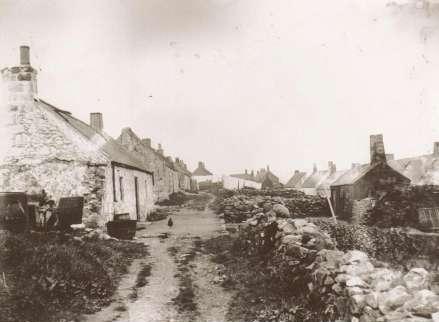
Thrummy Cap |
It is interesting to discover that Rabbie Burns has another link to Portlethen, and although somewhat tenuous it’s worth noting here. John Burness was a second cousin of the bard and a resident of Stonehaven. During his lifetime Burness was a baker and at various times served in the militia and it was during one of those periods of service that he embarked on a writing career. It would appear that he had something of his cousin’s literary talent for verse and he found some local fame, particularly with the poem Thrummy Cap, a light and humorous ghost story told in Scots verse.
Thrummy Cap
Quo’ Thrummy, Sir, we hae gaen will,
We thought we’d ne’er a house get till;
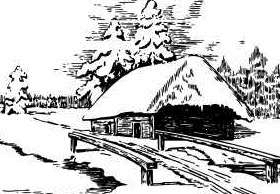 We near were smoor’d
amang the drift,
We near were smoor’d
amang the drift,
And sae guidman ye’ll mak a shift
Tae gie us quarters a’ this night,
For now we dinna hae day-light,
Farer to gang, though it were fair;
Sae gin ye hae a bed to spare,
Whate’er ye charge we canna grudge,
An’ satisfie you e’er we budge
To gang awa, when ’tis day,
Will pack our awls an’ tak our way.
The landlord says, “O beds we’ve nane,
“Our ain fouk they will scarce contain;
“But gin ye gang but twa miles forat,
“Aside the kirk dwells Robbie Dorat,
“Wha keeps a change, an sells guid drink,
“His house ye may mak out I think.”
Quo’ Thrummy that’s owre far awa,
The roads are sae blawn up wi’ snaw,
To mak it is nae in our power,
For look ye sic a dismal shower
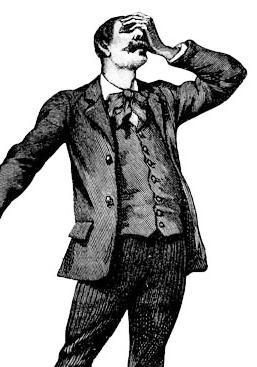 Is comin on; ye’ll lat
us bide,
Is comin on; ye’ll lat
us bide,
Though we sude sit at your fireside.
The landlord says to him “na na,
“I canna keep you here ava;
“Shamp aff, it is nae worth your while
“To byde, fan ye hae scrimp twa mile
“To gang; sae quickly aff ye’ll steer,
“For faith I doubt ye’s nae be here.”
Twa mile quo’ Thrummy, diel speed me
If frae your house this night I gae;
Are we to starve in Christian land,
As lang my sticks bides I’ my hand,
An’ siller plenty i’ my pouch?
To nane about this house I’ll crouch;
Come John, lat’s in, we’ll tak a seat,
Fat sorrow gars ye look sae blate;
Sae in he gaes, and sets him down,
Says he, they’re nane about your town
Sall put me out till a new day,
As lang as I’ve siller for to pay.
The landlord says, ye’re rather rash,
To turn you out we sanna fash,
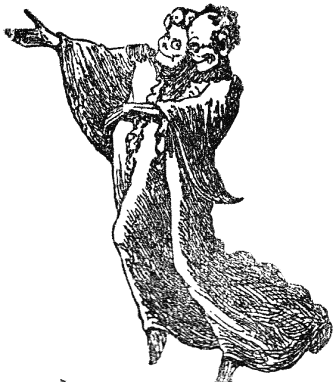 Since ye’re sae
positive to bide,
Since ye’re sae
positive to bide,
But troth, ye’ll sit by the fire-side.
I tald you ance, o’ beds I’ve nane,
Unnoccupied, except bare ane;
In it, I dread, ye winna ly,
For stoutish hearts hae aft been shy,
To venture in within the room
After the night begins to gloom;
It’s haunted by a frightful ghaist,
Oursells are terrified amaist
To bide about the town a’ night;
Sae ye may chance to get a sight,
Like that whilk some o’ our folk saw,
Far better till ye gang awa,
Or else ye’ll maybe rue e’er day.
So
where’s the connection here with Portlethen? Unfortunately John Burness’
literary career never quite took off and, as he seemed unable to prosper
as a baker, he eventually found employment canvassing for subscribers on
behalf of a publishing company. It was during this calling that he
perished in a snowstorm at a spot very near the
church of Portlethen on
the night of the 12th of January 1826. His body was found
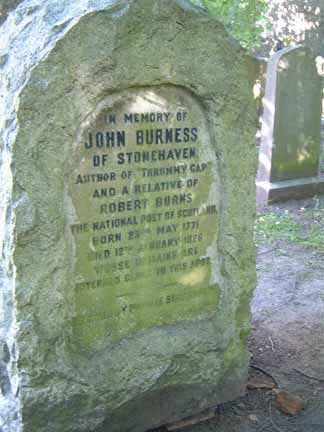 four days later by some farm servants who were clearing snow from the
road. He was later interred in the Spital Cemetery
in Aberdeen.
four days later by some farm servants who were clearing snow from the
road. He was later interred in the Spital Cemetery
in Aberdeen.
It’s rather ironic that “Thrummy Cap” tells us of a cold winter’s night of snow, drifting and people looking for shelter from the storm and his own death is very nearly a mirror image of the circumstances which he wrote about in his poem. Did Burness find himself in a similar situation to those which he wrote and was forced to choose between sharing a room with a “frightful ghaist” or to take to the roads that were “sae blawn up wi’ snaw”? Who knows what location Burness had in mind when he originally wrote this verse however I like to think that the locale of Portlethen fits very well with the story and the fact that he met his demise in this area makes for a very credible, yet ironic, coincidence.